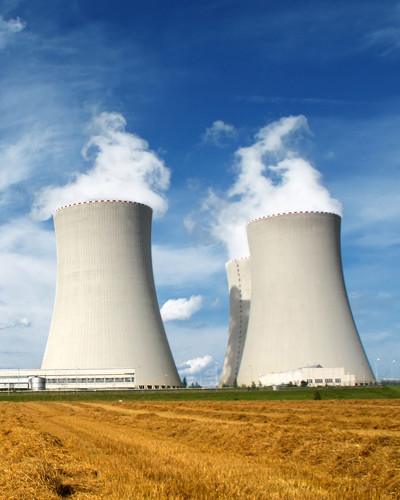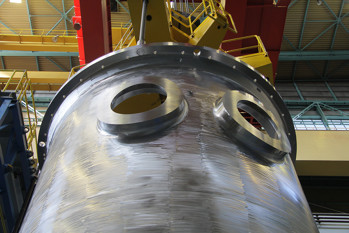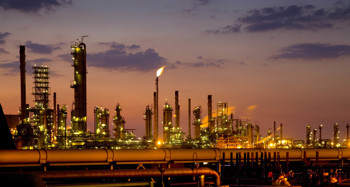Energy and Process Engineering

Power Engineering provides deeper knowledge of heat transfer, mass transfer, fluid mechanics and energy transformation. The students choose a more specific orientation of power engineering: Combustion equipment and boilers, Thermal turbines, Industrial power engineering and Nuclear power engineering. There is a wide range of compulsory elective and recommended subjects which enable the students to choose the topic of their diploma thesis easily. This field of study trains experts both for the sphere of conventional and nuclear power engineering and renewable energy sources. The field Power Engineering, along with the fields of Environmental technology, Process engineering and Instrumentation and Control Engineering forms part of an integrated field Designing systems which consists mainly of huge participation of students in projects focused on the essential subjects which thus ensures quality education in the given sphere in spite of decreasing interest in the technical fields.
In the Process Engineering theoretical fundamentals are extended by professional disciplines focused on transfer of momentum, heat and mass and on physical chemistry. Among the characteristic and profile courses are hydromechanic, thermal and diffusion separation processes and reactors and also courses focused on deeper knowledge of flexibility and strength of materials and mechanics. Students are acquainted with the theory of creating concepts of production lines and their designing within the given subject and other subjects focused on projects. An integral part of the curriculum is protection of the environment focused on sewage and gas treatment. The curriculum is oriented on the basic principles of conversion of raw materials, creation and processing of infinite and discrete objects, applied methods of transformation and modification of energy.
Graduate profile
 Students of the field of Power Engineering gain comprehensive knowledge of power engineering focused particularly on development, preparation of projects, designing and technology of power engineering machinery and systems. They are thus prepared to deal with theoretical and practical issues in various spheres of power engineering, i.e. production and consumption of energy, heat and cold. The field is oriented on creation of projects, design and operation of power engineering machines and equipment for conventional and nuclear power plants, refrigeration technology and heat pumps, equipment for exploitation of renewable energy sources and pneumatic and hydraulic machines. Naturally, there is also an emphasis on increase of effectivity, economic and environmental aspects of energy transformations. The graduates find jobs in development, research and design departments, as heads of power engineering departments in power plants, in the state administration and in the sphere of power engineering consultancy and audits.
Students of the field of Power Engineering gain comprehensive knowledge of power engineering focused particularly on development, preparation of projects, designing and technology of power engineering machinery and systems. They are thus prepared to deal with theoretical and practical issues in various spheres of power engineering, i.e. production and consumption of energy, heat and cold. The field is oriented on creation of projects, design and operation of power engineering machines and equipment for conventional and nuclear power plants, refrigeration technology and heat pumps, equipment for exploitation of renewable energy sources and pneumatic and hydraulic machines. Naturally, there is also an emphasis on increase of effectivity, economic and environmental aspects of energy transformations. The graduates find jobs in development, research and design departments, as heads of power engineering departments in power plants, in the state administration and in the sphere of power engineering consultancy and audits.
 Graduates of the Process Engineering master modern methods of obtaining scientific and technological information as well as methods of obtaining and processing experimental data. They are led to systematic designing and technical-economic assessment of process options, concepts of manufacturing lines and detail solutions of each machine and equipment system. They master designing and performing strength calculations of pressure equipment and creating concepts of production lines. A significant piece of knowledge the students gain is the use of computer technology in scientific and engineering calculations, collection of experimental data, control or process simulation, computer-aided designing with CAD methods, creating projects and utilization of computer networks. Mechanical engineers trained in this programme adapt very well in research, development and designing of machines, production lines and plants, in engineering and supplier companies and in companies using the technologies. They work in operational management, maintenance and repairs of fixed capital. They will find jobs mainly in the chemical, food and consumer-goods industries and also in the field of recovery and treatment of raw materials, power engineering departments, agriculture, pharmaceutical industry, service industry and other spheres of the infrastructure.
Graduates of the Process Engineering master modern methods of obtaining scientific and technological information as well as methods of obtaining and processing experimental data. They are led to systematic designing and technical-economic assessment of process options, concepts of manufacturing lines and detail solutions of each machine and equipment system. They master designing and performing strength calculations of pressure equipment and creating concepts of production lines. A significant piece of knowledge the students gain is the use of computer technology in scientific and engineering calculations, collection of experimental data, control or process simulation, computer-aided designing with CAD methods, creating projects and utilization of computer networks. Mechanical engineers trained in this programme adapt very well in research, development and designing of machines, production lines and plants, in engineering and supplier companies and in companies using the technologies. They work in operational management, maintenance and repairs of fixed capital. They will find jobs mainly in the chemical, food and consumer-goods industries and also in the field of recovery and treatment of raw materials, power engineering departments, agriculture, pharmaceutical industry, service industry and other spheres of the infrastructure.


